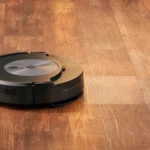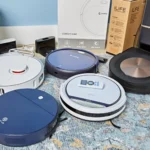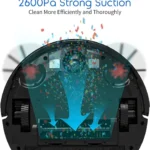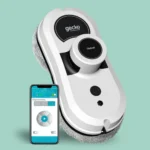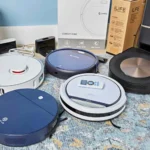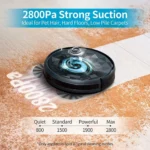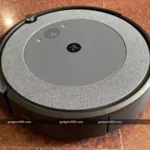When it comes to choosing the best battery for your smart vacuum cleaner, there are a couple of options that stand out: Lithium-ion batteries and NiMH batteries. Both are widely used in many household devices, including smart vacuums, and they each have their pros and cons. But which one should you go for? This is a question that has left many homeowners feeling perplexed. In this article, we’ll compare the two types of batteries in terms of battery life, charging time, and cost, so you can make an informed decision. So hold on tight, and let’s dive into the world of smart vacuum batteries.
Lithium-Ion Batteries
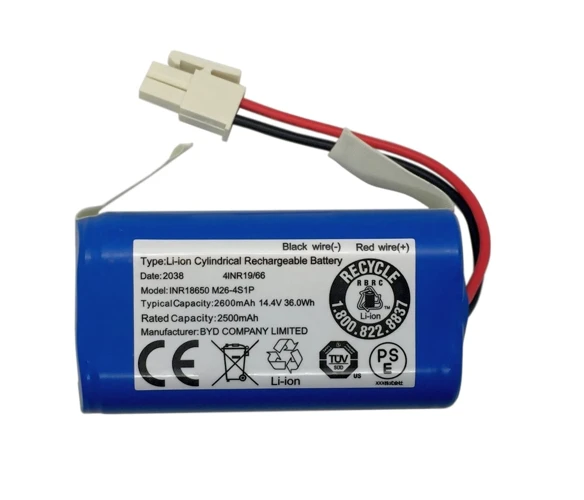
As the heart of any smart vacuum cleaner, battery performance plays a crucial role in determining the cleaning efficiency and overall satisfaction of the user. In comparison to traditional NiMH batteries, Lithium-ion batteries have taken the market by storm due to their superior performance and longer lifespan. In this section, we will examine the advantages and disadvantages of Lithium-ion batteries in-depth and highlight key differences between them and their NiMH counterparts. If you want to learn more about the importance of checking your smart vacuum battery, you can find helpful tips in our article about the significance of battery checks for smart vacuums.
Advantages
Both lithium-ion and NiMH batteries have their own particular advantages when it comes to powering smart vacuum cleaners. Below are the advantages of each type of battery:
Lithium-Ion Batteries:
- Higher energy density: Lithium-ion batteries have a higher energy density than NiMH batteries, which means they can hold more power in a smaller and lighter package. This makes them a great choice for smart vacuum cleaners that need to be agile and easy to maneuver.
- Longer lifespan: Lithium-ion batteries have a longer lifespan than NiMH batteries, meaning they can be charged and discharged more times before they start to lose their capacity. This makes them a more cost-effective choice in the long run, as they won’t need to be replaced as often.
- Quick charging: Lithium-ion batteries can be charged much more quickly than NiMH batteries. This means that if you only have a short amount of time to charge your vacuum cleaner battery, lithium-ion would be the better choice.
- Less self-discharge: Lithium-ion batteries have a lower rate of self-discharge than NiMH batteries. This means they can hold their charge for longer periods of time, making them more convenient if you only use your vacuum cleaner sporadically.
Lithium-ion batteries are a superior choice for smart vacuum cleaners when it comes to performance and endurance. They offer a higher energy density, longer lifespan, quicker charging, and less self-discharge than NiMH batteries. However, they do come at a higher cost.
If you are interested in learning more about the battery life of smart vacuum cleaners and how to maintain their performance, check out our article on smart vacuum battery degradation prevention.
Disadvantages
Lithium-Ion Battery Disadvantages
While lithium-ion batteries have many advantages, they are not without their downsides. Here are a few things to consider before choosing this type of battery for your smart vacuum cleaner:
| Disadvantages | Explanation |
|---|---|
| Expensive | Lithium-ion batteries are typically more expensive than other types of batteries, which might not make them the most cost-effective option. |
| Can Overheat | While rare, lithium-ion batteries can overheat and potentially cause a fire if they are not handled or charged properly. |
| Battery Life Degradation | Lithium-ion batteries can lose capacity over time with subsequent charge-discharge cycles. In other words, their battery life gradually declines with regular use. |
| Complex Recycling Process | While lithium-ion batteries are recyclable, they require a complex and often costly recycling process. This means they can be more challenging to dispose of or recycle. |
As you can see, while lithium-ion batteries offer great performance, they also have some drawbacks that you should consider before making your final decision. Remember to check your smart vacuum cleaner’s battery regularly by referring to our guide on smart vacuum battery check. If you have any concerns about your battery life, make sure to refer to our guidelines on smart vacuum cleaner battery troubleshooting. If you notice any top signs for smart vacuum battery replacement, it might be a good time to look for a new battery. The more you learn about your battery, the better your vacuum’s performance will be.
NiMH Batteries
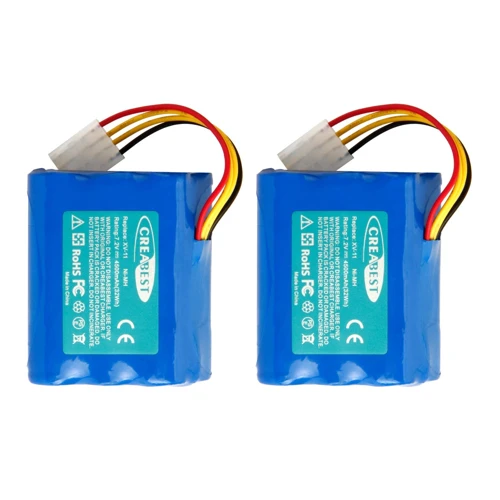
When it comes to powering smart vacuum cleaners, Nickel-metal hydride (NiMH) batteries are a common alternative to Lithium-ion. These batteries provide a reliable and cost-effective solution for users who don’t require the power and longevity of Lithium-ion batteries. However, despite their widespread use, there are certain limitations to their use that you should be aware of. In this section, we’ll explore the advantages and disadvantages of NiMH batteries, and compare them to Lithium-ion batteries to help you make an informed decision about the best battery for your smart vacuum cleaner. To learn more about battery life and charging cycles, check out our article “Charging Cycles and Battery Runtime for Smart Vacuums”, or read about how battery life affects smart vacuum performance in our article “How Battery Life Impacts Smart Vacuum Performance.”.
Advantages
When it comes to the advantages of lithium-ion batteries for smart vacuum cleaners, there are several noteworthy points to consider. Here’s a breakdown of the benefits:
| Advantages of Lithium-Ion Batteries |
|---|
| Longer Life Span: Lithium-ion batteries typically have a longer lifespan compared to other rechargeable batteries. They can handle more charge and discharge cycles, which ultimately extends the life of the battery. This is particularly important in smart vacuum cleaners since they require a lot of energy to operate for extended periods. |
| Efficiency: Lithium-ion batteries are very efficient when it comes to power delivery. They have a high energy density, which means they have a high capacity to store energy while remaining relatively small in size. This is important for smart vacuum cleaners, as they require batteries that can deliver a lot of power in a small package. |
| Faster Charging: Lithium-ion batteries can charge faster than other types of rechargeable batteries. They have a higher charging rate, meaning they can be charged fully in a shorter amount of time. This is particularly convenient for smart vacuum cleaners, which may need to be charged frequently with the constant cleaning tasks they perform. |
| Lightweight and Portable: Lithium-ion batteries are also relatively lightweight and portable compared to other types of batteries. This is important for smart vacuum cleaners, which are designed to be easily maneuverable and portable. A light battery adds to the convenience of carrying a vacuum cleaner from room to room, especially when cleaning stairs and hard-to-reach areas. |
| No Memory Effect: Lithium-ion batteries do not have a memory effect, which means they do not need to be fully discharged before recharging. This is a notable advantage over other battery types, which may require fully discharging before recharging to ensure optimal performance. The lack of memory effect means that lithium-ion batteries can be recharged at any time, which is particularly convenient for smart vacuum cleaners. |
Lithium-ion batteries are an excellent choice for smart vacuum cleaners, as they offer several advantages over other types of batteries. These benefits include a longer lifespan, higher efficiency, faster charging time, portability, and no memory effect.
Disadvantages
When it comes to disadvantages of Lithium-Ion batteries for smart vacuum cleaners, it’s important to note that they are more expensive than other options. Additionally, they can be sensitive to high temperatures and may require additional safety features to prevent issues like overheating or swelling.
It’s also worth noting that Lithium-Ion batteries can be vulnerable to a phenomenon known as “thermal runaway”. This occurs when the battery overheats so much that the electrolyte inside it turns to gas and creates pressure that further activates the overheating. This leads to a chain reaction that can cause a dangerous explosion. Manufacturers have taken steps to prevent this through various safety features, but it can still happen.
On the other hand, for NiMH batteries, one of the main disadvantages is the fact that they have a higher rate of self-discharge than Lithium-Ion batteries. This means that they lose charge even when not in use, which can be frustrating for users who don’t want to constantly worry about charging their vacuum cleaner.
Another potential disadvantage of NiMH batteries is that they have a lower energy density than Lithium-Ion batteries. This means that they may not last as long on a single charge, which could be a concern for larger homes or commercial cleaning settings.
Both types of batteries have their own set of disadvantages that need to be considered when choosing a smart vacuum cleaner. It’s important to weigh the pros and cons of each before making a decision based on your individual needs and budget.
| Lithium-Ion Batteries Disadvantages | NiMH Batteries Disadvantages |
|---|---|
| More expensive | Higher rate of self-discharge |
| Sensitive to high temperatures | Lower energy density |
| Vulnerable to thermal runaway |
Comparison
As we weigh the pros and cons of lithium-ion and NiMH batteries for smart vacuum cleaners, it’s important to dive into the details of their performance. Let’s now take a closer look at how these two types of batteries compare in terms of battery life, charging time, and cost. By examining each of these factors, we can come to a better understanding of which option may be best suited for our individual needs.
Battery Life
When it comes to battery life, lithium-ion batteries generally outperform NiMH batteries. They have a higher energy density, which means they can store more energy in the same physical size as a NiMH battery. This leads to a longer run time for smart vacuum cleaners using lithium-ion batteries.
For example, the Dyson V11 uses a lithium-ion battery to provide up to 60 minutes of run time, while the Shark ION F80 uses a lithium-ion battery to provide up to 80 minutes of run time. In comparison, the iRobot Roomba 985 uses a NiMH battery and provides up to 90 minutes of run time.
It’s important to note that battery life can vary depending on factors such as the power mode of the vacuum and the type of floor being cleaned. However, as a general rule, lithium-ion batteries provide longer run time than NiMH batteries.
Here’s a comparison table highlighting the estimated battery life for some popular smart vacuum cleaners using lithium-ion and NiMH batteries:
| Vacuum Cleaner | Battery Type | Estimated Battery Life |
|---|---|---|
| Dyson V11 | Lithium-Ion | Up to 60 minutes |
| Shark ION F80 | Lithium-Ion | Up to 80 minutes |
| iRobot Roomba 985 | NiMH | Up to 90 minutes |
As you can see from the table, smart vacuum cleaners with lithium-ion batteries tend to have a shorter battery life compared to those with NiMH batteries. However, this is because lithium-ion batteries provide stronger suction power, which can clean more efficiently and quickly. Lithium-ion batteries can be charged more frequently, which can make up for the shorter run time. Lithium-ion batteries are a great choice when it comes to battery life for smart vacuum cleaners.
Charging Time
When it comes to comparing lithium-ion and NiMH batteries for smart vacuum cleaners, charging time is a crucial factor to consider. In general, lithium-ion batteries are known for their faster charging time compared to NiMH batteries. Let’s take a closer look at the charging time of both battery types.
Lithium-Ion Batteries Charging Time: These batteries typically take between 2 to 3 hours to fully charge. However, some newer models of lithium-ion batteries can charge up to 80% of their capacity in just 30 minutes. This means that you can charge your smart vacuum cleaner battery quickly and efficiently, allowing it to get back to work in no time.
NiMH Batteries Charging Time: Since NiMH batteries have a lower energy density than lithium-ion batteries, they typically take longer to charge. In general, they can take between 3 to 6 hours to fully charge. NiMH batteries also have a lower charge efficiency than lithium-ion batteries, meaning that they lose some of their energy during the charging process.
To summarize, when it comes to charging time, lithium-ion batteries are the winner. They are faster and more efficient when it comes to charging your smart vacuum cleaner. However, it’s important to note that newer models of NiMH batteries may offer faster charging times than older models. Additionally, the charging time can vary depending on the specific brand and model of the smart vacuum cleaner.
Here is a comparison table for charging time:
| Battery Type | Charging Time |
|---|---|
| Lithium-Ion Batteries | 2 to 3 hours |
| NiMH Batteries | 3 to 6 hours |
Cost
When it comes to the cost of lithium-ion vs NiMH batteries for smart vacuum cleaners, there are a few things to consider. Here are some key points and differences between the two:
Lithium-Ion Batteries:
- Cost more upfront: Lithium-ion batteries are generally more expensive than NiMH batteries.
- Last longer: However, they also tend to have a longer lifespan and can withstand more charge and discharge cycles before needing to be replaced.
- More efficient: Lithium-ion batteries are typically more energy-efficient than NiMH batteries, which means they can provide more power for longer periods of time.
NiMH Batteries:
- Are cheaper: NiMH batteries are generally cheaper than lithium-ion batteries, which can make them a more appealing option if you’re on a tight budget.
- Not as durable: However, they also tend to have a shorter lifespan and may need to be replaced more frequently than lithium-ion batteries.
- Less efficient: NiMH batteries are less efficient than lithium-ion batteries, which means they may not be able to provide as much power or run for as long without needing to be recharged.
When considering the cost of your smart vacuum cleaner’s battery, it’s important to remember that lithium-ion batteries may cost more upfront but can ultimately save you money in the long run due to their longer lifespan and greater efficiency. On the other hand, NiMH batteries may be a more budget-friendly option, but they may require more frequent replacements and may not provide as much power or run time. Ultimately, it comes down to weighing the upfront cost of the battery against its long-term value and choosing the option that best fits your needs and budget.
Conclusion
All in all, both Lithium-Ion and NiMH batteries have their own advantages and disadvantages when it comes to using them in smart vacuum cleaners.
After examining the pros and cons of both battery types, it is clear that Lithium-Ion batteries have a clear edge when it comes to battery life and charging time. With a longer lifespan, Lithium-Ion batteries require less maintenance and last for many more cleaning cycles. They also have quicker charging times, meaning less time spent waiting for the vacuum cleaner to recharge.
However, NiMH batteries may come out on top in terms of cost. While Lithium-Ion batteries are generally more expensive to produce and as a result, more expensive to purchase, NiMH batteries are cheaper to manufacture and thus, often found in more budget-friendly smart vacuums.
In the end, the type of battery you decide to use in your smart vacuum will come down to your personal preferences and priorities. If you prioritize the convenience of a longer battery life and quicker charging times, then Lithium-Ion is the way to go. If you are more budget-conscious and don’t mind sacrificing some battery life and charging convenience, then NiMH batteries may be a better option for you.
Whichever choice you make, one thing is for sure, advancements in battery technology are consistently being made, and the future looks bright for the world of smart vacuum cleaners. We can only hope that future developments will bring even better battery performance, allowing for even more efficient and effective cleaning.
Frequently Asked Questions
1. How do lithium-ion batteries work?
Lithium-ion batteries work by moving lithium ions between electrodes, which creates an electrical charge. They are rechargeable and offer a high energy density.
2. What are the advantages of lithium-ion batteries?
Lithium-ion batteries have a longer lifespan, higher energy density, and faster charging times than NiMH batteries. They are also lighter and more compact.
3. What are the disadvantages of lithium-ion batteries?
Lithium-ion batteries tend to be more expensive and can be more unstable than NiMH batteries. They also require special handling and disposal procedures when they reach the end of their life.
4. How do NiMH batteries work?
NiMH batteries work by using nickel oxide hydroxide and metallic hydride as their electrode materials. They are rechargeable and offer a moderate energy density.
5. What are the advantages of NiMH batteries?
NiMH batteries are generally less expensive than lithium-ion batteries and are more environmentally friendly. They are also less prone to overheating and do not require special disposal.
6. What are the disadvantages of NiMH batteries?
NiMH batteries have a shorter lifespan and slower charging times than lithium-ion batteries. They are also larger and heavier, which can affect the overall weight and design of a smart vacuum cleaner.
7. What factors affect battery life?
Frequent charging, high temperatures, and heavy usage can all affect battery life. It’s important to follow manufacturer guidelines and avoid overcharging or discharging the battery completely.
8. Can I use lithium-ion batteries in place of NiMH batteries?
This depends on the specific model and requirements of your smart vacuum cleaner. It’s best to check with the manufacturer to ensure compatibility.
9. How long do lithium-ion batteries last?
Lithium-ion batteries can last several years with proper care and maintenance. However, their lifespan can be affected by usage patterns and environmental factors like temperature and humidity.
10. Can I replace the battery in my smart vacuum cleaner?
This may depend on the specific model and design of your smart vacuum cleaner. Some models may have replaceable batteries, while others may require special tools or professional installation. It’s best to check with the manufacturer or consult the user manual.

